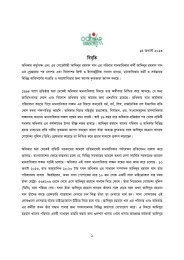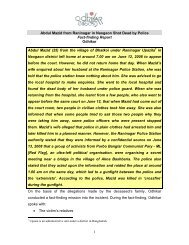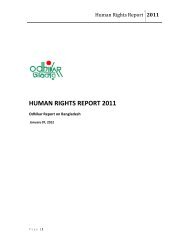Please - Odhikar
Please - Odhikar
Please - Odhikar
Create successful ePaper yourself
Turn your PDF publications into a flip-book with our unique Google optimized e-Paper software.
Gang-Inspired Fear: A Particularly Pervasive Problem<br />
Both case-specific and community-wide fear of retaliation are often fed by the fear that<br />
incarcerated gang members will return quickly to the community after serving brief sentences or<br />
will be able, from behind bars, to arrange for friends or family members to threaten potential<br />
witnesses. Because connections between incarcerated gang members and neighborhood gangs<br />
are often uninterrupted, most witnesses no longer feel that imprisonment of the defendant<br />
pending trial, or even after conviction, can ensure their safety in the community.<br />
The mere fact that a crime is gang-related can be sufficient to prevent an entire neighborhood<br />
from cooperating. This type of community-wide intimidation is especially frustrating for<br />
prosecutors and police investigators because, while no actionable threat is ever made in a given<br />
case -- thereby precluding conventional responses -- witnesses and victims are still discouraged<br />
from testifying.<br />
Fear Is Not the Only Reason Witnesses Do Not Testify<br />
It is argued that fear is only one of several factors that may deter witnesses from testifying;<br />
strong community ties and a deep seated distrust of the criminal justice system can also be<br />
formidable barriers to cooperation. Many of the communities in which gangs operate are worlds<br />
unto themselves -- places where people live, attend school, and work all within a radius of only a<br />
few blocks beyond which they rarely venture. As a result, victims and witnesses are often the<br />
children of a defendant's friends or relatives, members of the same locality as the defendant, or<br />
classmates or neighbors. Furthermore, community residents may regard many of the crimes for<br />
which witnesses are sought as private "business matters" among gang members or drug dealers,<br />
rather than as offenses against the community which should inspire willing civic participation in<br />
the process of law enforcement. To many, the police are "outsiders" who do not understand or<br />
care about their problems.<br />
At the same time, most of the key witnesses who need their protection in gang- and drug-related<br />
cases are themselves "bad guys" -- or, as is often said, "today's witness is tomorrow's suspect."<br />
Some witnesses are even said to be "commuter victims" -- drug dealers and gang members who<br />
were on their way to committing a crime when they were victimized. These individuals are often<br />
unwilling to testify, not necessarily because they fear retaliation, but because they want to avoid<br />
any contact with the criminal justice system if there are (real or imagined) outstanding warrants<br />
against them, if they think they might be arrested for having broken the conditions of their<br />
release, or if they have developed a lifelong dislike for and mistrust of police officers and<br />
prosecutors.<br />
It is also observed that many members of some minority and ethnic groups avoid cooperating<br />
with the criminal justice system for cultural reasons, including a sense of group loyalty that<br />
makes them reluctant to testify against members of their own culture.<br />
How Serious Is Witness Intimidation in Bangladesh?<br />
It is very difficult to ascertain the precise extent of witness intimidation because no scientific or<br />
social research has been conducted on the problem yet. However, it is agreed that witness<br />
intimidation is widespread, that it is increasing, and that it seriously affects the prosecution of<br />
violent crimes.<br />
Report 2005<br />
157











